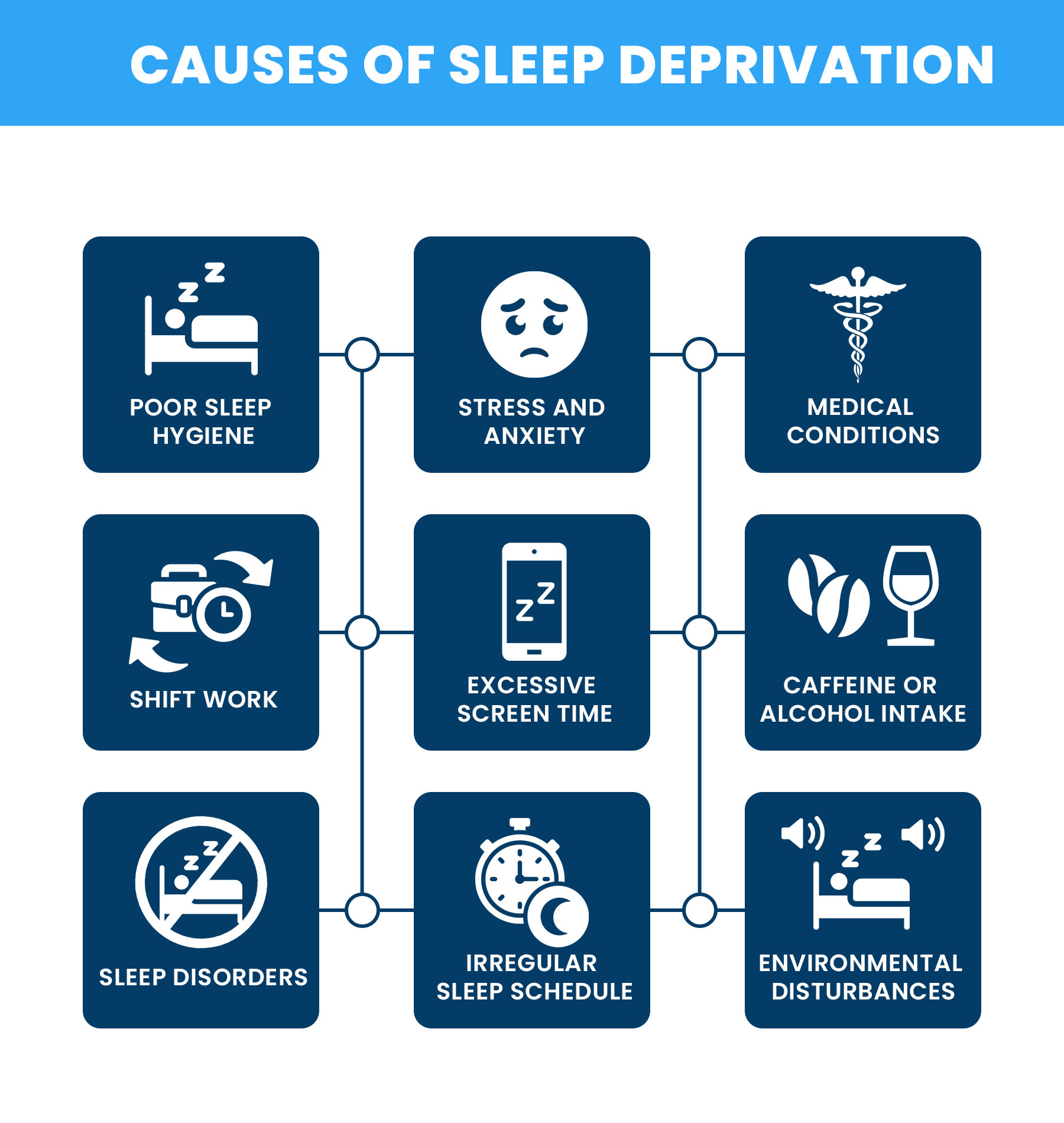Typically, most people need more than three hours of sleep. Some may feel fine after a short rest, but most adults need 7 to 9 hours of sleep per night to be at their best. Chronic sleep deprivation, like sleeping only three hours every night, may result in many other effects, including poor memory, lack of concentration, weak immune system, and the possibility of major diseases like heart disease and diabetes.
Many people fail to get the recommended amount of sleep. Stress, work demands, anxiety, lifestyle habits, sleep disorders, and many others can all lead to an inability to fall asleep and stay asleep.
The emergence of screens and digital devices has also caused problems with individuals' sleep patterns because they constantly expose themselves to screens, making it difficult for them to wind down by nightfall.
For others, sleep disorders like insomnia or sleep apnea may interfere with their ability to attain restful, uninterrupted sleep. Consequently, they may consistently get less sleep than their body requires, significantly impacting physical and mental health.
What are the Recommended Hours of Sleep?
The amount of sleep for a recommended number of hours differs in every age group, and every life stage requires a different amount to allow optimal health and development. General guidelines for the recommended hours of sleep by age are found below:
| Age Group | Recommended Sleep |
|---|---|
| Newborn (0-3 months) | 14-17 hours |
| Infant (4-11 months) | 12-15 hours |
| Toddler (1-2 years) | 11-14 hours |
| Preschooler (3-5 years) | 10-13 hours |
| School-age (6-13 years) | 9-11 hours |
| Teen (14-17 years) | 8-10 hours |
| Young Adult (18-25 years) | 7-9 hours |
| Adult (26-64 years) | 7-9 hours |
| Older Adult (65+ years) | 7-8 hours |
The National Sleep Foundation has suggested recommendations based on the number of hours most people will sleep, maintaining a good level of health physically and mentally, and functioning correctly. However, a few might get by with even fewer hours or more.
Is Your Lifestyle Contributing to Your Sleep Deprivation?
Yes, your lifestyle can contribute significantly to sleep deprivation. Many modern habits and environmental factors disrupt sleep, making it harder for individuals to get the rest they need. Here are some of the everyday lifestyle habits that may be affecting sleep:
Screen Time: Heavy phone, computer, or TV use before bed will impair one's ability to sleep. Screens emit blue light that suppresses melatonin production, a hormone that regulates the body's sleep cycles.
Caffeine and Alcohol Consumption: Consuming caffeine late in the day or alcohol close to bedtime can interfere with your ability to fall asleep or stay asleep. Caffeine is a stimulant that keeps you awake and alert, and although alcohol will knock you out, it disrupts the cycle of sleep during the night.
Irregular Sleep Schedule: Constant changes in sleep and wake times, whether to go to work, attend to social activities, or for any other reason, can disturb the body's internal clock, or what is scientifically known as circadian rhythm, making one wake up at different times each night. Here are some tips to help you maintain a proper sleep schedule.
Stress and Anxiety: Huge stress, anxiety, or worry causes a lot of trouble when sleeping. Often, racing thoughts and much concern during bedtime end up with either insomnia or a restless night.
Lack of Physical Activity: Regular exercise helps regulate the circadian rhythm, leading to better sleep. Conversely, a sedentary lifestyle can lead to poor sleep quality and difficulty falling asleep.
Unhealthy Eating Habits: Ingesting heavy or heavy foods, especially in the later evenings of the day, could provoke uncomfortable situations and indigestions, leading to difficulties falling into slumber. A diet of large proportions of sugar and refined food can also result in some sleep disorders.
Environmental Factors: People with diseases such as hypersensitivity to noise may find it hard to get sound rest in an uncomfortable setting due to bright lights or hard sleeping mattresses.

Health Effects of Insufficient Sleep
There are many poor health effects of inadequate sleep, both short-term and long-term. Short-term adverse effects can consist of cognitive impairment in concentration or memory, slower reaction rates, irritability, or even anxiety or depression mood swings.
Over time, chronic sleep deprivation has an added risk to more severe conditions such as cardiovascular diseases, including hypertension and heart disease, reduced immunities to diseases, excessive weight, and diabetes, among others. It is also an added predisposition to psychiatric conditions; depression and anxiety are other conditions linked with sleep loss. This would decrease a person's potential lifespan while reducing their quality of life.
Why Do Some People Think 3 Hours of Sleep is Enough?
Some people believe 3 hours of sleep is enough because of misconceptions or pressures from other sources. The reason behind this is a misunderstanding about the sleep cycle. They might believe a full sleep cycle, which takes approximately 90 minutes, is enough to rest. However, a full night of sleep includes several cycles, and getting only 3 hours does not allow the body to recover or restore itself completely.
Another factor is the use of stimulants such as caffeine or energy drinks. These chemicals can hide the feeling of tiredness, making people feel more alert even after a few hours of sleep. While they feel energized in the short term, they do not replace the therapeutic benefits of sleep.
Cultural pressures, especially in demanding jobs, often push people to forgo sleep time. Some generally think that working or studying until midnight is worthy of merit: the less one sleeps, the more productive one is- or so one may think. This completely overlooks the long-term health and well-being consequences of insufficient sleep.
Is it possible to train yourself to function on less sleep?
While some people can get by temporarily with less sleep, it is neither recommended nor sustainable long-term. The body needs its required amount of sleep to recharge physically and mentally, and continuously depriving it of such a need can result in ill health. Some people can become accustomed to reduced sleep time for short periods, but it tends to compromise their cognitive functioning, alertness, and immunity.
It leads to chronic sleep deprivation and subsequently increases the risk of serious health issues, including heart disease, diabetes, and mental health disorders. Although some methods, such as improving sleep quality or optimizing sleep environments, help one maximize rest in a shorter time, the body typically needs 7–9 hours per night for optimal functioning.
Final Thoughts
While some believe sleeping for only a few hours is enough, most adults require 7 to 9 hours of sleep per night for optimal health. Chronic sleep deprivation can impair memory, concentration, and immunity and exacerbate the risk of serious conditions such as heart disease and diabetes.
Factors such as increased screen time, stress, increased caffeine intake, and irregular sleep schedules may interfere with the normal duration of rest and produce less than usual sleep. The body may temporarily adapt to less sleep, but this may be detrimental to overall well-being in the long run. In contrast, proper sleep can help maintain both physical and mental health.












